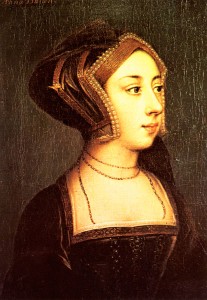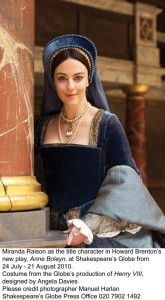 There was an interesting article in Saturday’s Daily Mail entitled “Anne Boleyn, harlot or heroine? Was she a scheming sexual predator, or a brave reformer who changed Britain for ever?” about Anne Boleyn, the myths surrounding her and Howard Brenton’s new play “Anne Boleyn” which is being performed at The Globe.
There was an interesting article in Saturday’s Daily Mail entitled “Anne Boleyn, harlot or heroine? Was she a scheming sexual predator, or a brave reformer who changed Britain for ever?” about Anne Boleyn, the myths surrounding her and Howard Brenton’s new play “Anne Boleyn” which is being performed at The Globe.
While I applaud Brenton for writing this play, which sounds like it challenges some of the many labels which Anne has been given in the past (witch, wh*re, harlot, sexual predator), I wonder if, like the Victorians, Brenton is swinging too far the other way. In the article, Brenton talks of Anne Boleyn being “a Joan of Arc, driven by religious vision” and while I agree that Anne had a role in the English Reformation and was passionate about religious reform, I don’t see her as a woman who gave her life for her faith or who purposely initiated the reformation in England. A woman with a true faith and passion for reform, but no Joan of Arc.
A French Lover?
According to the article, Brenton also has an interesting idea about Anne’s love life, believing that her first lover was a French Protestant – hmmm, I haven’t found any evidence of that. I believe wholeheartedly that it was Anne’s time in France, combined with her father’s interest in the New Religion, which gave Anne her passion for reform, but I believe it had more to do with the women she spent time with there, the daughters of Anne of Brittany (Queen Claude and Renée of France) and Marguerite of Angoulême, rather than any love affair.
Anne Boleyn and the Reformation
We also have to remember that Anne Boleyn was no Protestant, that label did not even exist then. She may have been a catalyst of the English Reformation and influenced Henry VIII with her “heretical” reading material, but she was reformist rather than Protestant and she died in the Catholic faith. As my good friend, Olivia Peyton, said to me: “Anne Boleyn did not want to throw the baby out with the bathwater”, meaning that Anne could see that the Catholic Church was fundamentally ok, she did not reject the established religion and its rituals, but she realised that reform was required – the church needed some work! Anne’s almoner, John Skip, defended the ceremonies and rituals of the Catholic church in a sermon supported by Anne, defending them as aids to memory rather than the belief that they had sacred power. Eric Ives points out too that the reformist literature Anne was reading was not necessarily challenging the belief in transsubstantiation, that Christ’s body was present in the consecrated host, but instead was challenging “the late medieval focus on the miraculous mechanism of the mass rather than its significance”. Ives goes on to explain that:-
“Her attitude would be characteristic of all shades of English evangelical reform for at least a decade more: real spiritual experience, yes; the priority of faith, yes; access to the Bible, yes; reform of abuses and superstition, yes; but heretical views on the miracle of the altar, no.”
I think that we need to throw out the myths regarding Anne, both good and bad, and stop bad history in its tracks. Let’s challenge people who present Anne Boleyn as a harlot, witch and sexual predator, but also question those who think she was a Protestant martyr and leader of the Reformation.
Who was Anne Boleyn?
So, how would I describe my Anne, the Anne Boleyn I believe in?
- A Renaissance woman who loved the New Learning and Arts
- A highly intelligent woman who could hold her own in debates with her husband, Henry VIII
- A woman of style – Her “Frenchness” made her stand out at the English court
- A woman who was not a classical beauty or English rose, but someone who had sexual magnetism and made people’s heads turn
- A passionate reformer – Someone who was interested in religious reform and the ideas coming from the continent and who hated the superstition that seemed to have taken root in the Church
- A woman of faith – It is clear that Anne had a true personal faith
- A hot-tempered and outspoken woman
- A charitable woman who was concerned about poverty and education
- An ambitious woman who loved the limelight
- A woman ahead of her time
- A loving mother who wanted her daughter close by her and to see her as often as she could
- A stubborn woman – Her role of “Perseverance” was spot on
- A woman who was not afraid to upset people and make enemies
- A feisty woman who was not afraid to take risks and who lived life to the full
My Anne was no sexual predator or witch but she was far from perfect and was not a martyr. Who was your Anne Boleyn?

Anne Boleyn at the Globe
Howard Brenton’s “Anne Boleyn” is on at The Globe between now and the 21st August and looks like a wonderful play. Starring as Anne is Miranda Raison, who played Jo in “Spooks”, and the blurb from The Globe website says:-
“Anne Boleyn celebrates the life and legacy of a great English heroine – traditionally seen as either the beautiful and virtuous victim of a tyrant husband, or as an ambitious and ruthless reformist manipulating her way into power.
But Brenton puts a very different Anne – and her ghost – on the Globe stage. Witty, flirtatious and confident, she’s in love with Henry but also with the most dangerous ideas of her day. Conspiring with the exiled William Tyndale, Anne plots to produce a Bible that everyone can read – a translation that will permit her marriage to Henry, haunt her daughter’s successor, and transform Britain forever.”
Tickets can be ordered online at http://www.shakespeares-globe.org/theatre/annualtheatreseason/anneboleyn/
If you go and see it then please let me know, as I’m unable to go and I’d love someone to review it for the site.
Notes and Sources
- “Anne Boleyn, harlot or heroine? Was she a scheming sexual predator, or a brave reformer who changed Britain for ever?” – Article from The Daily Mail, 24th July 2010
- The Life and Death of Anne Boleyn, Eric Ives, chapters on “The Advent of Reform” and “Personal Religion”
Further Reading
Read more about Anne Boleyn’s faith and her role in the Reformation in:-